- Home
- Sean Platt
Judgment Page 18
Judgment Read online
Page 18
But according to the story Clara had told Peers that first day, the Astrals hadn’t known when the Templars and Mullah worked to relocate the Ark. Sure, it had been moved centuries ago while the Astrals were away, but it made no difference that the mansion had been built right under the Astral eye. The aliens stayed out of human political affairs; Kindred had confirmed as much from his time running Heaven’s Veil. Once the roof was on the building, the Mullah and their famously tight-lipped workers would have been able to do as they wished. The Astrals could have forced their way inside for inspections, sure, but that would have made for bad human-Astral public relations — an even trickier balancing act this visit than in their prior ones.
The feeling of being watched escalated, and sent a chill up his spine.
Being watched by Mullah — who, being Mullah, would know exactly who Peers Basara was and had always been.
But also being watched by Astrals, the way the aliens had (again, according to Clara’s story) seemed to allow Cameron’s group to reach Mount Sinai then watched them discover the Ark.
Watched their approach.
Then watched them leave without doing what they’d come to do, off to wander the desert for five years rather than ever return.
What had happened that day? Why had they run?
Curiosity dug at his insides, but Cameron’s latest bout of suspicion meant it would be a while before Peers could ask anything without Cameron suspecting ulterior motives.
There was another Mullah symbol etched into the concrete block, just below a heavy-duty metal shelf bracket.
Peers touched it. Pressed it. Rubbed it like Aladdin summoning the genie from his lamp. He was tempted to say, “Open sesame” but thought he’d heard something elsewhere in the house a moment ago — maybe someone stirring for a late-night snack. He hadn’t done anything but felt intensely guilty. Old guilt, like bile in his throat.
I’m just standing around inside a utility room. Nothing wrong with that.
But whatever was bugging Peers was deeper down, under his skin like a parasite. He couldn’t place the reason, but staring at the symbol in the bricks made it worse. The last time he’d seen that symbol was …
Was …
Peers remembered his father. He remembered the fury. He remembered a sinking sensation that not only had he angered his family and friends but that what he’d done — however unwittingly — went even deeper. Toward betrayal, like a traitor.
He’d never understood what he’d done so wrong other than causing one hell of a mess out of (let’s face it) a bunch of stupid old rocks.
But then he remembered the blue disc.
He remembered his father’s face when he’d realized what Peers had done.
The hand — not the belt — had gone up to correct the disobedient boy. The flash of Father’s Mullah ring as the hand swung back for the strike had been indelibly engraved in Peers’s memory.
The ring.
There was a box of nails on one of the higher shelves. Peers reached in and retrieved three. Maybe he was wrong about this, and the strangely precise rings were merely symbols of membership in the secret society and nothing more. Or maybe the rings were keys, but the locks they opened couldn’t be fooled by picking tools as crude as nails.
But Peers didn’t think so. The Mullah had always been more about symbolism than practicality, more about ritual than rationality. Twenty years ago, he’d managed to open a door he shouldn’t have been able to open, and with no ring to do it.
He pressed the nails into the three triangular indentations, at precisely the same time.
There was a hard click, and one of the cinderblocks jumped forward an inch — revealing not the back of a cinderblock but a small, concealed drawer.
Inside the drawer was a perfectly round, perfectly smooth sphere of what looked like brushed aluminum. The size of a cricket ball covered with fine blue lines like a magnified circuit.
Feeling the same sense of I shouldn’t do this that he’d felt touching the blue disc two decades earlier, Peers took the sphere in both of his hands, finding a single pulsing tentacle-like wire protruding from its back, attached somewhere at the drawer’s rear.
“What are you, friend?” Peers whispered to the sphere, only half his mind noticing the rush of feet passing beyond the utility room door.
The lights went out.
The sphere answered.
CHAPTER 34
“Cameron. Come on, Cam, wake up.”
Cameron blinked. Piper was above him, dressed in a robe, her face flushed and bothered.
“What?”
“Get up. Grab your robe.”
“Why?”
“Clara’s missing.”
“Missing?” His eyes darted to the hallway past Piper. He spied Lila at the door, arms crossed, Meyer beside her.
“We don’t know where she is.”
“You don’t know where she is, or she’s missing?”
“That’s the definition of missing, Cameron!”
Cameron held up one hand, all at once seeing the depth of emotion around him. He sat on the bed, with a nod to Meyer and a meaningful look to Lila, then stood. The cobwebs were intense. It felt like he’d been sleeping deeper than he had in years, and swimming to the surface from a dead slumber now was like rising from the ocean’s floor, fighting narcosis.
“Tell me what happened.” He said it to Meyer, knowing it was a sexist thing to do. But Piper had been thinly stretched for a while, and Lila, if she truly thought her daughter was in trouble, wouldn’t be sensible. Kindred, Jeanine, and Charlie would all have been rational and clear, but for now, the gentler-and-kinder Meyer would have to do.
“Lila and I were in the main room, talking by the fire. Piper came in and asked if we’d seen Clara. She’d gone to peek in on Lila, next door. But she was with me, and Clara wasn’t in her bed.”
“That doesn’t mean she’s missing,” Cameron said.
“There’s something about this place I don’t like, Cam,” said Piper, again composed. She hugged her elbows, subconsciously mimicking Lila, and sent her eyes to the room’s corners. “I feel like we’re being followed. Or watched. I just got this itch. That’s why I peeked in. I even felt stupid doing it, like I was being ridiculous. But the door was ajar, with enough light from the hallway to see that Lila’s sheets had been thrown back. So I went in. You know how Clara sleeps: like a brick. So I went ahead and turned on the lights. I just wanted to tuck her in. I … I just kind of had the shivers.” She laughed to show the situation was all silly and stupid, but Cameron could tell from the laugh’s artifice that in Piper’s mind, at least, it was anything but. “I just wanted to run my hand through her hair, you know? The way you’d pet a dog or cat to feel better.” And she laughed again, this one decidedly manufactured. Cameron could see her fingers shaking and somehow felt sure they’d been shaking before she’d opened Lila’s door.
“I left her in bed. I couldn’t sleep, but she was conked out.” Lila seemed ready to say more but merely hugged her elbows tighter. Cameron could see Lila trying to keep herself together, maintaining sensible tones and stifling her speech against a clearly creeping panic.
“She’s probably just wandering,” Cameron said.
Meyer nodded to indicate agreement, but even his mannerisms struck Cameron as phony. “We’ve already been up and down the big hallways. Pretty much everything on this side of the palace with the lights on. But yes, you know how Clara is.” He forced himself to add, with a tiny artificial smile, “Curious like George.”
In the beat after Meyer stopped speaking and before Cameron answered, the mansion’s stillness struck Cameron like a physical thing. They’d spent most of the past years either in ramshackle shelters, in small outpost towns, in co-opted vehicles, or out in the open. All of those places were full of sounds. But despite the way city light filled the windows of the bedroom, the night’s silence, inside these four rock-solid walls, was absolute. Cameron spoke because Meyer required a reply —
but even more because without sound he felt suddenly deaf.
No wonder Piper was so edgy. No wonder Lila seemed panicked despite a normal incident of childlike wandering off. It was the silent night forging the perfect slate for waking nightmares.
“Did you check with the others? Maybe Clara went into their rooms.”
“Why would she go in with Charlie? Or Jeanine?”
“I don’t know; I’m just making suggestions,” Cameron replied, a trifle perturbed. Even his own annoyance came out of the blue. Piper was right: it was this strange place, this luxurious captivity.
“The doors are all closed,” Meyer said. “I’m not even sure which rooms everyone is in.”
Cameron wanted to roll his eyes. Kindred would have known. For the first time Cameron had ever seen, Meyer and Kindred had parted ways for the night with issues unsolved between them. Kindred had gone to bed with the others, clearly irritated with Meyer’s obstinance. If Kindred were here, they’d know which rooms were whose. And if Kindred and Meyer were firing on the same cylinders as the combined logical entity they often became, they’d know the whole damned palace’s layout, right down to having concocted an action plan for possible escape.
Cameron sighed, seeing that he would have to be in charge. He didn’t like it but always ended up leading any group he joined. That was why he’d always preferred to travel alone — or, sometimes, with a trusted companion like Dan had been, who understood Cameron’s past and individual quirks. But there were only four of them awake right now, and the trio of Lila, Piper, and Meyer had felt sufficiently unable to solve things on their own that they’d woken Cameron.
“Fine,” he snapped.
Cameron pushed past Piper without warmth then between Lila and Meyer. He was still tired, logy, and missing his bed. Why did everyone have to ask him which way to go all the damned time?
A cool finger seemed to press itself against his neck. Facing away from the others, he closed his eyes and breathed deeply.
It’s this place. It’s Jabari. It’s our predicament. It’s what they keep telling me I have to do whether I want to or not. You can be calm. You don’t need to be on edge, or irritated.
“Come on,” he said.
CHAPTER 35
The totally dark, silent, and sensorily disconnected place Peers found himself should have been terrifying but wasn’t. He’d been here before.
The Mullah elders called it “the vestibule.” They trained for immersion, knowing that its total absence of stimulation could cause panic — and that panic, in a mental space disconnected from a very real but unfelt physical reality — could quickly unravel even the sturdiest mind. So the elders took their vision quests into the desert alone, sometimes building sweat lodges and smoking psilocybin, often wandering with nowhere to go and no way out. There were places deep in old ruins and converted caves where the elders had built voluntary confinement chambers, constructing shallow pools to float for hours or days in solitude with their ears plugged and eyes covered, breathing through reeds. Peers had always been curious about those nether realms as a child, and after moving to Oxford had sought sensory deprivation chambers to feel what it must have been like. But word among the Mullah was firm, and the rule — like all tenets in the clan — was unbreakable: only the elders entered the vestibule, and only those elders who’d prepared their minds for the nothingness they found inside.
The kids all had their secretly whispered beliefs, the way boys on the outside had covert theories about where adults hid porn. The children all talked about the practices and about the space and about what probably happened inside. You could go mad, they’d say, because the vestibule is nothing, and it’s what you think that controls what you see.
And still they’d try to sneak in. Even when the secret box was heaved from place to place, they’d plot to find its new location and touch what should never be touched. It was the same feeling Young Peers had while standing over a nest of asps, knowing he should back away but still wanting to reach out and nudge the hissing mother with his foot. The same feeling he’d felt, years later, at the top of Dubai’s Burj Khalifa tower, looking down, thinking of how if there was no glass, the devil inside him might not be able to resist the urge to jump.
We all have darkness inside, Jacob, the Mullah wise man, had said. Our need to destroy ourselves is the reason we are not yet ready. Although that time is coming. And in the day we reach the vestibule untempted, each of us will be ready to heed the Horsemen’s call.
Well, if you were wise, Peers had always thought. If you were wise, you could face the vestibule and find out if you were ready — whether you were a man pure of heart or still a kid with reckless tendencies. Peers had once asked Jacob if he could ever enter the vestibule. If he’d ever be sufficiently controlled, adequately mature. It was a right of passage he’d never face, a test he’d never be allowed to attempt.
And, he’d thought even as a ten-year-old, Fuck that.
But in the end, who’d had the last laugh? Peers, now a proper adult despite Jacob’s high-handed condescension, was back in the vestibule. It hadn’t destroyed him the first time and wouldn’t destroy him now. He hadn’t needed training after all, either time. His exile wasn’t so bad. Providence had given him another chance to prove himself, and now here he was again: in a Mullah place, seeing through the Horsemen’s eyes. What he thought, he’d receive. He knew what to do, no matter that Jacob had ultimately called him an unworthy disgrace.
He floated in the black space, seeing, hearing, and sensing nothing. He couldn’t even feel the heavy brushed-metal sphere in his hands, in the real-world utility closet inside Mara Jabari’s palace.
His mental eyes seemed to look down. He realized that he still had hands and that there was a silver sphere with blue lines across its surface nestled in them. There was a pulsing line leading from the sphere’s back, but in this place the thick wire vanished into nothing rather than being anchored in back of a hidden drawer.
He wondered, Is this the same place? Is this the true vestibule, the way I visited it in the past? What is this object, and how did it come to be here?
The sphere lit in his hands then vanished. The room changed around him, becoming a building under construction. Much of the surrounding landscape was arid nothing, and Peers found himself realizing that the sphere’s artificial reality had placed him very close to his body’s current position. He was seeing Jabari’s palace before it had become one, seeing Ember Flats when it had still been a speck in the desert.
Ahead, in hot sun that Peers seemed to feel on his skin, he saw a tall, muscular, bare-chested Titan. In the alien’s hands, the sphere looked tiny. The Titan handed the thing to a woman covered head to toe in black. She slipped it beneath the fabric, and it was gone. But then Peers saw a man very near where he seemed to be standing — someone he recognized: Akeem, whom Peers had known when they’d been children together. He’d changed as he’d grown, but Peers knew it was Akeem because the sphere knew it was Akeem, just as the sphere knew the Titan was being watched when he’d handed the memory sphere to the human.
Understanding came, dripped into his cortex as if from above.
The sphere holds Astral memories. Like the Ark, except that it records a subsection of alien experiences rather than human ones.
It creates a space like the portal vestibule, but it is not the same as the portal.
It was given to the human leaders to facilitate understanding of what came before so they’d understand what must come next.
But the Mullah stole it. Connected it. Kept it hidden because they controlled construction.
And that all made sense, Peers thought, considering that the relationship between Astrals and Mullah had always been complicated. The two sides of universal detente shook hands across distance then spent their time apart stabbing each other in the back. It had been the Mullah’s idea to hide the Ark, though only the elders knew Sinai had been its destination until Clara had divulged the secret to Peers. It had been the Mull
ah’s idea to remove the key and hide it in America. The Mullah had left the tablet under Vail, where the Ark had been last set by the Astrals. So double-dealing was nothing new, though they’d always had the small blue disc that nobody outside the elder circle even knew was a small blue disc — until Peers, of course.
But something itched at Peers as he watched the scene — the answer the sphere had given to his last question — slowly dissolve and return to black. If the sphere held Astral memories, and if they included Akeem watching the Titan’s handoff, didn’t that mean the Astrals had known Akeem was watching and planned to steal the sphere?
Peers felt an abiding sense of complacency surround him as if the air itself had smugly smiled.
The black vestibule seemed to nudge him, to ask what he most wanted to know from the sphere.
Well, that was easy.
What happened at Mount Sinai, when Cameron and his group went to find the Ark?
It felt like a question the sphere couldn’t answer, seeing as Cameron’s group wouldn’t have approached their quarry if they thought they’d been followed. But Peers felt himself slipping into a memory as if seen from above, and at a distance. A simple, no-nonsense understanding slipped into his mind, and Peers knew he was seeing from the eyes of Divinity.
Events unspooled as Peers felt himself slip into the skin of experience — as if he’d been there, and this was happening now. Cool, wet air kissed his skin, and he felt hard rock underfoot. He was inside the mountain’s heart, down a corridor the Mullah had excavated and hidden. He must be inside a human mind (or at least steeped in the weak, underdeveloped mental network that had so surprised the Astrals on arrival) because somehow Peers, even now, five years removed from the events before him, felt certain that they were alone. There were no aliens here. They’d beaten the Astrals, and found the Ark first.
“It’s this way,” said a voice.
Peers looked over his shoulder. As the memory solidified, it was becoming impossible to tell reality from artifice. He was here, now. In a biblical mountain’s ancient cave. And now was two years after Astral Day, not the seven he’d so recently believed.

 Jumper: Books 1-6: Complete Saga
Jumper: Books 1-6: Complete Saga WhiteSpace Season One (Episodes 1-6)
WhiteSpace Season One (Episodes 1-6) Tomorrow's Gone Season 1
Tomorrow's Gone Season 1 Yesterday's Gone: Episode 1
Yesterday's Gone: Episode 1 Yesterday's Gone: Seasons 1-6 Complete Saga
Yesterday's Gone: Seasons 1-6 Complete Saga The Beam- The Complete Series
The Beam- The Complete Series The Tomorrow Gene
The Tomorrow Gene Karma Police: Karma Police Book Two
Karma Police: Karma Police Book Two The Fall (Karma Police Book 5)
The Fall (Karma Police Book 5)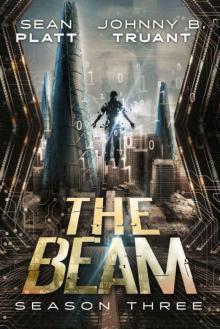 The Beam: Season Three
The Beam: Season Three Resurrection
Resurrection No Escape (No Justice Book 2)
No Escape (No Justice Book 2) Deviant (Karma Police Book 4)
Deviant (Karma Police Book 4)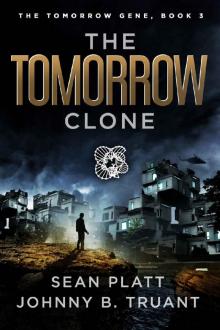 The Tomorrow Clone (The Tomorrow Gene Book 3)
The Tomorrow Clone (The Tomorrow Gene Book 3) Unicorn Western
Unicorn Western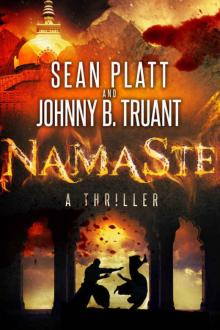 Namaste
Namaste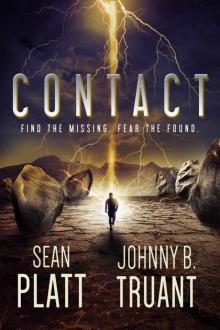 Alien Invasion (Book 2): Contact
Alien Invasion (Book 2): Contact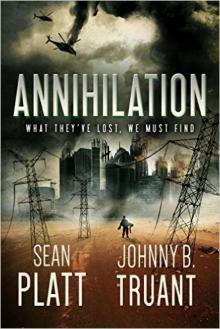 Alien Invasion (Book 4): Annihilation
Alien Invasion (Book 4): Annihilation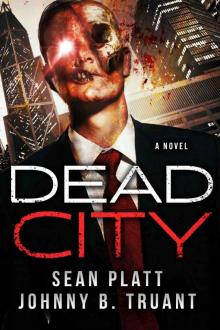 Dead City
Dead City The Eden Experiment
The Eden Experiment Unicorn Genesis (Unicorn Western)
Unicorn Genesis (Unicorn Western)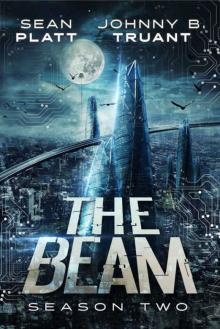 The Beam: Season Two
The Beam: Season Two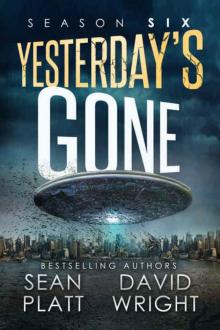 Yesterday's Gone: Season Six
Yesterday's Gone: Season Six Homecoming (Karma Police Book 6)
Homecoming (Karma Police Book 6)![[Alien Invasion 01.0] Invasion Read online](http://i1.bookreadfree.com/i1/03/30/alien_invasion_01_0_invasion_preview.jpg) [Alien Invasion 01.0] Invasion
[Alien Invasion 01.0] Invasion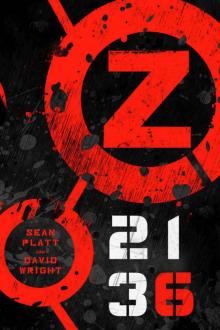 Z 2136 (Z 2134 Series Book 3)
Z 2136 (Z 2134 Series Book 3)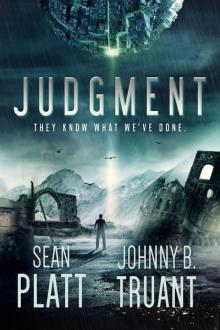 Alien Invasion (Book 5): Judgment
Alien Invasion (Book 5): Judgment Threshold
Threshold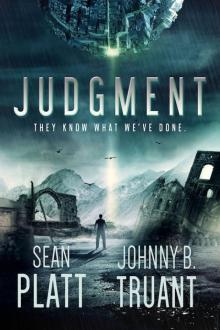 Judgment
Judgment Jumper: Karma Police Book One
Jumper: Karma Police Book One Boricio Goes Camping (Dark Crossings)
Boricio Goes Camping (Dark Crossings) Extinction
Extinction Yesterday's Gone (Season Four): Episodes 19-24
Yesterday's Gone (Season Four): Episodes 19-24![[No Justice 01.0] No Justice Read online](http://i1.bookreadfree.com/i2/04/09/no_justice_01_0_no_justice_preview.jpg) [No Justice 01.0] No Justice
[No Justice 01.0] No Justice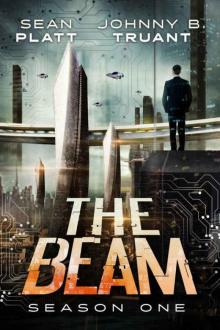 The Beam: Season One
The Beam: Season One La Fleur de Blanc
La Fleur de Blanc The Collectors (Karma Police Book 3)
The Collectors (Karma Police Book 3)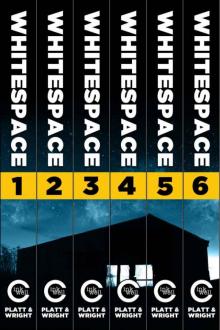 WhiteSpace: Season One (Episodes 1-6 of the sci-fi horror serial)
WhiteSpace: Season One (Episodes 1-6 of the sci-fi horror serial)